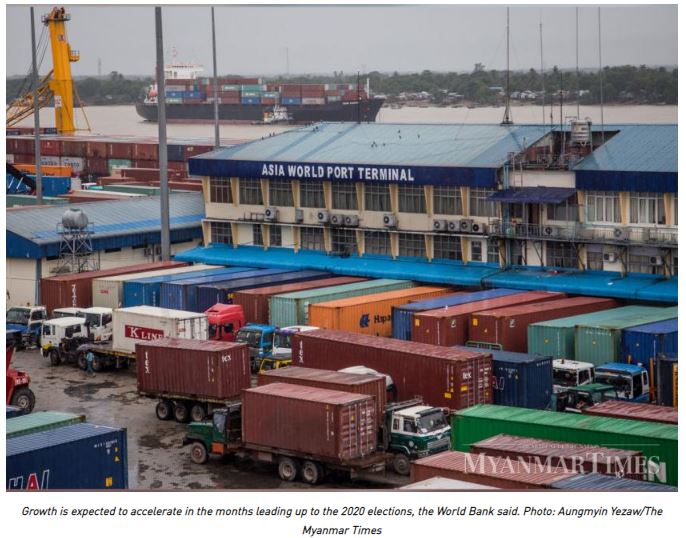Myanmar: Banking reforms, higher investments will drive better growth: World Bank
Myanmar’s GDP growth is expected to accelerate to 6.5 percent in 2019-20, supported by public investment leading up to the elections in 2020, after which growth is expected to expand to 6.6pc, according to the World Bank’s April 2019 East Asia and Pacific Economic Update, launched yesterday.
However, the economy is projected to slow 6.2 pc in 2019 from 6.8 pc in 2018 due to weaker industrial performance, exchange rate volatility and rising cost pressures.
The trade deficit is expected to narrow in the current fiscal year ending September. This is because exports, particularly of garment products, have accelerated, while imports of capital goods have slowed. The slower pace of imports is consistent with the lower volumes of private investment estimated between October 2018 and April this year.
Things are forecast to improve from now on though, backed by higher public and private investments as a result of domestic reforms and macro stability, the World Bank said.
Andrew Mason, acting chief economist for the East Asia and Pacific region of the World Bank, said recent reforms in the banking and financial sectors have helped to draw higher foreign investor interest in Myanmar. These include allowing foreign banks to expand and lend to local businesses and opening up the insurance sector to foreign ownership.
Mason added that the authorities should keep up efforts to strengthen the business environment and promote the peace process, both of which encourage investments.
The World Bank’s report comes after the International Monetary Fund (IMF) also released its forecast earlier this month. It expects economic growth of 6.4pc in the current fiscal year, which is lower than 6.8pc between April 2017 and March 2018. The economy is forecast to grow at an annualised pace of 6.2pc in the six months to September 2018.
The IMF said growth is estimated to “remain below potential” this year due to weakening export demand and subdued private construction activity. While expected to accelerate this year and next, the growth trajectory is subject to downside risks related to Rakhine. External uncertainties include trade tensions, high crude oil prices and spillovers from exposure to China, the IMF said.
Local businesses are less optimistic, too. “The international organisations’ approach to the Myanmar economy is largely macroeconomic where local businessmen approach the country’s economy at a more microeconomic level,” said U Maung Maung Lay, vice chair of the Union of Myanmar Federation of Chambers of Commerce and Industry.
“While some sectors are improving, other industries are still struggling with issues like illicit trade,” he added.
In addition, Myanmar still faces the risk of a withdrawal of the European Union’s Generalised System of Preferences (GSP), under which the country enjoys trading favour with the bloc’s member countries. If revoked, exports are likely to take a big hit.
Source: https://www.mmtimes.com/news/banking-reforms-higher-investments-will-drive-better-growth-world-bank.html


 Thailand
Thailand




